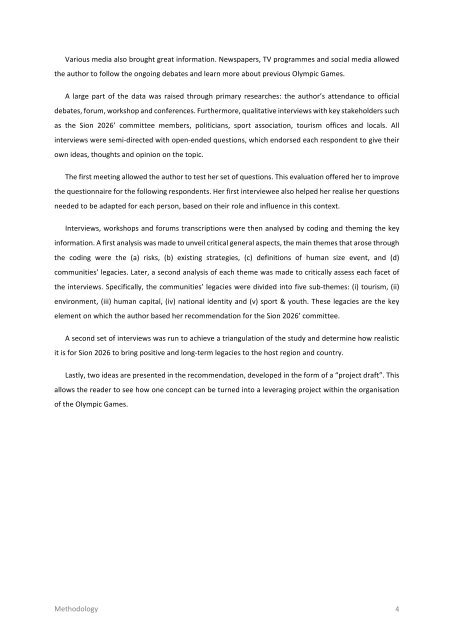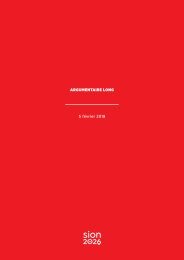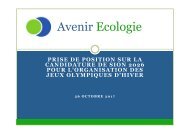Reviving the Flame
Travail de Master de Tiffany Duc
Travail de Master de Tiffany Duc
Create successful ePaper yourself
Turn your PDF publications into a flip-book with our unique Google optimized e-Paper software.
Various media also brought great information. Newspapers, TV programmes and social media allowed<br />
<strong>the</strong> author to follow <strong>the</strong> ongoing debates and learn more about previous Olympic Games.<br />
A large part of <strong>the</strong> data was raised through primary researches: <strong>the</strong> author’s attendance to official<br />
debates, forum, workshop and conferences. Fur<strong>the</strong>rmore, qualitative interviews with key stakeholders such<br />
as <strong>the</strong> Sion 2026’ committee members, politicians, sport association, tourism offices and locals. All<br />
interviews were semi-directed with open-ended questions, which endorsed each respondent to give <strong>the</strong>ir<br />
own ideas, thoughts and opinion on <strong>the</strong> topic.<br />
The first meeting allowed <strong>the</strong> author to test her set of questions. This evaluation offered her to improve<br />
<strong>the</strong> questionnaire for <strong>the</strong> following respondents. Her first interviewee also helped her realise her questions<br />
needed to be adapted for each person, based on <strong>the</strong>ir role and influence in this context.<br />
Interviews, workshops and forums transcriptions were <strong>the</strong>n analysed by coding and <strong>the</strong>ming <strong>the</strong> key<br />
information. A first analysis was made to unveil critical general aspects, <strong>the</strong> main <strong>the</strong>mes that arose through<br />
<strong>the</strong> coding were <strong>the</strong> (a) risks, (b) existing strategies, (c) definitions of human size event, and (d)<br />
communities’ legacies. Later, a second analysis of each <strong>the</strong>me was made to critically assess each facet of<br />
<strong>the</strong> interviews. Specifically, <strong>the</strong> communities’ legacies were divided into five sub-<strong>the</strong>mes: (i) tourism, (ii)<br />
environment, (iii) human capital, (iv) national identity and (v) sport & youth. These legacies are <strong>the</strong> key<br />
element on which <strong>the</strong> author based her recommendation for <strong>the</strong> Sion 2026’ committee.<br />
A second set of interviews was run to achieve a triangulation of <strong>the</strong> study and determine how realistic<br />
it is for Sion 2026 to bring positive and long-term legacies to <strong>the</strong> host region and country.<br />
Lastly, two ideas are presented in <strong>the</strong> recommendation, developed in <strong>the</strong> form of a “project draft”. This<br />
allows <strong>the</strong> reader to see how one concept can be turned into a leveraging project within <strong>the</strong> organisation<br />
of <strong>the</strong> Olympic Games.<br />
Methodology 4





